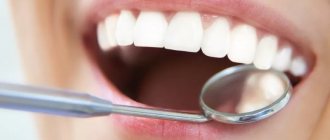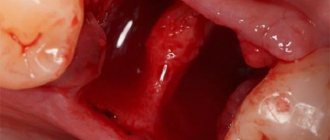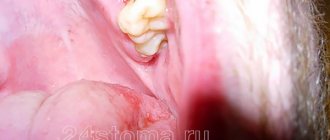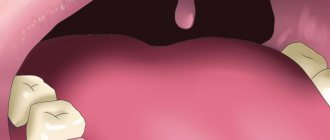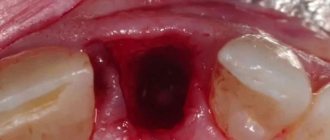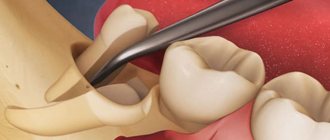From this article you will learn:
- Why you can’t eat after tooth extraction
- Is it possible to smoke after tooth extraction?
- When and what can you eat after tooth extraction?
- Alcohol before surgery - possible consequences
- Possible complications if you ignore the ban
- Alcohol after dental treatment
- What is allowed to drink after tooth extraction?
- How long after can you drink alcohol?
- Alcohol after dental implantation
- Other complications in which drinking alcohol is prohibited
Tooth extraction, according to dentists, is an operation of despair. Long gone are the days when it was easier to remove a molar than to treat it. Now doctors are fighting to the last to save all the teeth. They even try not to remove wisdom teeth without compelling evidence.
Tooth extraction is a physically and mentally difficult operation for the patient. Therefore, many people try to relieve stress with alcohol. Often this decision leads to serious complications.
Alcohol after dental treatment
The effect of alcohol on a treated tooth
How long after dental treatment can you drink alcohol?
Is it possible to drink carbonated or foamy drinks after dental treatment?
Is it possible to smoke after surgery?
A toothache can strike at the most unexpected moment, including before a planned feast. Is it possible to drink alcohol after dental treatment? What consequences can this lead to?
OTHER COMPLICATIONS IN WHICH DRINKING ALCOHOL IS PROHIBITED
A visit to the dentist to remove a tooth may be required at any time. Various events, parties, and special occasions may occur at this time. Holidays are the reason that a person who has undergone surgery is looking for an answer to the question of how long alcohol should not be consumed after tooth extraction. Drinking strong drinks for a period of one day to a longer period is not recommended in the following situations:
- after the procedure, the doctor prescribed medications that should not be taken together with intoxicating drinks;
- when removing, the dentist used anesthesia, application or injection anesthesia;
- You should not visit the dentist with a hangover. The human body in this state reacts inadequately to medications and anesthesia. The doctor will definitely reschedule the visit after seeing the patient’s well-being;
- Whitening and stone removal is a reason to forget about alcohol for a few days. Otherwise, you can harm the enamel and reduce the doctor’s work to nothing. Let normal sensitivity return, then you can remember your favorite drinks;
- Dental implantation is a complex procedure that involves a long-term ban on drinking any alcohol. We are talking about several days before the operation and several weeks after it;
- antibiotics, and sometimes the dentist prescribes a long course to the patient, are a contraindication for drinking alcohol. This type of medication should never be mixed with alcohol.
After tooth extraction, you can drink alcohol after some time. The minimum period is one day. The maximum time depends on the individual characteristics of the person who underwent the operation. You should not put your health at risk by getting short-term pleasure from intoxicating drinks. A simple piece of advice will help you protect yourself: after or before the procedure, you should ask your doctor about the entire list of prohibitions, including those related to when you should start drinking alcohol. Health is most important!
The effect of alcohol on a treated tooth
Some people think that alcohol after dental treatment additionally disinfects the oral cavity, but doctors say the opposite. After dental treatment, especially after treatment of pulpitis or periodontitis, the body needs rest. Not only the daily routine should be gentle, but also the diet, so at this time it is better to give up alcoholic beverages.
Let's tell you why.
- Alcohol can cause bleeding because alcohol dilates blood vessels and increases blood pressure.
- When drinking alcohol, the oral mucosa is irritated, the healing process slows down, and the risk of inflammation increases.
- Alcohol increases the load on the cardiovascular system and liver.
- Alcoholic drinks in combination with an anesthetic can cause headache, weakness, and convulsions.
Despite the fact that the effect of anesthesia wears off on average after two hours, the breakdown products continue to remain in the body for several more days.
Alcohol before surgery: possible consequences
The strict ban on drinking alcohol before tooth extraction is due to many factors that can have an extremely negative impact on both the patient’s health and the course of the operation. You can see a number of problems below.
- Weak or completely absent effect of anesthesia;
- The recovery process after surgery takes much longer;
- Increased risk of inflammatory processes;
- Intoxication and the body’s rejecting reaction to medications.
IMPORTANT!
If a patient comes to an appointment while intoxicated, the doctor has the right to refuse admission. This is due to the fact that a drunk person can negatively affect the progress of the operation.
Is it possible to drink carbonated or foamy drinks after dental treatment?
Gas is a constant irritant to the tooth, and foamy drinks (for example, kvass) contain yeast, which can get into the wound and cause discomfort. In addition, in the first days after tooth extraction, it is not recommended to drink drinks from straws. When sucking any drink, a vacuum is created in the mouth, which can tear a blood clot out of the hole.
How long should you not eat after having a filling installed?
If a filling made of chemical composites is installed, then you should refrain from eating and drinking for 2 hours. This is due to the fact that the material requires a certain time for final shrinkage and hardening.
If a “light” composite filling is installed, you can drink immediately, but you should abstain from food for 1.5-2 hours. But the reason is not in the material (it hardens a few seconds after application), but in anesthesia - with reduced sensitivity of the mucous membranes during eating, you can injure the tongue and mucous membranes of the cheeks on the inside.
During the day after the filling is installed, you should only eat warm foods - excessively hot or cold foods can lead to changes in the shape of the filling. It is necessary to chew food on the opposite side for the first day - this will allow the material to fully “adhere” to the tissues and take the desired shape, without the risk of damage.
When can a light seal be placed?
The photopolymer composition is considered universal, therefore it is widely used in dentistry. There are a large number of pathologies for which the dentist prefers this composite, including:
- caries;
- erosion and necrosis of enamel;
- fluorosis;
- wedge-shaped defect;
- pulpitis and periodontitis (light filling is placed at the final stage of disease treatment);
- dental injuries and chipped enamel;
- pathological abrasion of units (a photopolymer filling is installed for temporary restoration of the tubercles).
In addition, the dentist uses this filling material to give the stump the required size and shape before prosthetics with fixed dentures. Thanks to a wide palette of shades and good strength after hardening, the photopolymer composition is suitable for any units in the series; it is also chosen for aesthetic restoration.
What to do if your gums hurt after filling
The gums in the area where the anesthesia was administered may ache for several days - this is completely normal and does not require any measures. The mucous membrane may also be slightly inflamed if special rings were used during treatment, which are placed on the tooth to form the correct shape of its crown. The gums can also be damaged if the doctor had to install the filling material in close proximity to the mucous membrane or even under it - in such a situation the gums are deliberately pushed back. Therefore, pain is a normal reaction to external intervention.
All of these conditions are variations of the norm. But if the pain intensifies, redness and swelling of the mucous membrane progresses, you need to consult a doctor.
What is a light seal?
The photopolymer composite material that the dentist uses consists of a mixture of resins, silanes and filler.
It hardens when exposed to ultraviolet radiation, so when filling a tooth, the doctor uses a special lamp that creates waves with a length of 450 Nm in the blue spectrum. For a high-quality result, he applies the composite material layer by layer, exposing each layer to light. At this stage, primary polymerization occurs. Then, within 24 hours, the chemical bonds stabilize and the filling finally hardens. In this regard, the doctor gives certain recommendations, compliance with which guarantees the durability of the material - the filling lasts 5 years or more.
How to properly perform hygiene procedures
After treatment, brush the filled tooth carefully, applying minimal pressure to it. Do not use rinses containing abrasive substances and alcohol, which can increase the plasticity of the material - this will lead to a change in the shape of the filling. Also, do not use excessively hard brushes - they can leave microcracks in the material, which will quickly damage it.
In general, you should take care of teeth with fillings in a completely standard way:
- daily brushing of teeth twice a day - in the morning before breakfast and in the evening after all meals, after - rinsing the mouth with water and rinse,
- To clean the area of filled teeth after eating, it is better to replace dental floss with an irrigator. If you floss carelessly, you can touch the installed filling, especially if there are thin edges of the tooth, which will lead to its loss.
Why does a tooth hurt after a filling is installed?
Minor soreness may persist for several days or even a couple of weeks, which is explained by overheating of the tissue due to the use of boron. In some situations, for example, with deep caries or when treating front teeth, increased sensitivity can persist even for several months. But in such a situation, you should still consult a doctor for an x-ray to make sure that there is no infected tissue left under the filling and that inflammation has not affected the nerve.
If the pain intensifies, the filling darkens, black spots appear under it - all this indicates that the treatment was carried out poorly and re-inflammation has begun. This is a reason to see a doctor as soon as possible.
How to maintain your treatment guarantee
As a rule, therapeutic treatment, that is, dental filling, is guaranteed from 6 months to 2 years - depending on the volume of work and the complexity of the situation. To maintain the guarantee, the patient must strictly follow all recommendations: do not overload the tooth, do not use it for other purposes (for example, open beer bottles), and also regularly see the doctor in accordance with the individual schedule of medical examinations. Unfortunately, many patients forget about this, and it is the last point that is the key to maintaining the guarantee for treatment.
You need to visit a doctor 1-2 times a year. During a preventive examination, the dentist will be able to make sure that the filling is in good condition and that caries does not develop again underneath it.
Advantages of photopolymer material
This differs from other types of composite materials:
- The ability to control the hardening process. The doctor fills the tooth without haste, applying layers of material as carefully as possible. The composition is plastic, hardens only when exposed to an ultraviolet lamp.
- Safety for the patient's health. Photopolymer material is characterized by low toxicity, so it is used even in pediatric dentistry.
- The ability to create a filling of the desired shade. She won't stand out.
- Durability. It is due to good adhesion to hard tissues. Typically, the service life of a photopolymer filling is at least 5 years. With careful handling and high-quality teeth cleaning, its service life increases.
- Ease of finishing. The composite can be polished well, so the filling does not create discomfort - it will not scratch the mucous membrane of the tongue and cheeks.
An experienced dentist can easily give the crown the desired shape, so the filled tooth looks natural.
Why you shouldn't drink alcohol after tooth extraction
The ban on alcohol after extraction is not a simple formality and not a whim of doctors, it is a rule developed over years of practice. This is due to several serious reasons:
- Alcohol thins the blood. A wound that has just healed after removal can reopen, infection can get into it and provoke the development of inflammation, and with it pain and the risk of blood poisoning. As a result, you will find yourself back in the dentist's chair, but with a more serious and dangerous problem.
- Alcohol increases blood pressure, which can cause the patient to bleed heavily and make it difficult to stop. And the substances it contains have a negative effect on soft tissues and slow down the healing process.
- After the operation, the patient is prescribed painkillers and antibiotics that are incompatible with alcohol. Their combination can lead to a deterioration in health, including loss of consciousness and anaphylactic shock, not to mention double the load on the liver.
- Tooth extraction is a serious surgical operation that involves a significant burden on the body. Drinking alcohol-containing liquids also causes increased stress; as a result, our body spends the energy needed for rehabilitation on absorbing alcohol and fighting intoxication.
- Alcohol weakens willpower and provokes appetite; after drinking it, the patient will not be able to resist meals and snacks, especially unhealthy ones, high in fat and spices. All this can lead to infection, complications, severe inflammation, suppuration and sepsis.
- Spirits often contain flavorings, dyes, and other chemicals. All this negatively affects the liver and internal organs, causing swelling and pain in the mouth.
The consequences of violating the ban can be bleeding, severe pain, allergic reactions, inflammation and even poisoning. Therefore, no matter how great the temptation to drink a glass, it is better to refuse it or replace the contents with something harmless - juice or mineral water.
Types of light seals
The dentist chooses a photopolymer material depending on the location of the tooth and the task at hand - will it be caries therapy or the elimination of a non-carious defect on a unit.
There are 3 types of material:
- consisting of large particles - preferable for chewing molars, such a filling will be resistant to abrasion;
- consisting of microparticles - relevant in the case of treating caries on the front teeth and restoring the aesthetics of the units;
- nanocomposite - durable, reliable, aesthetic, but has a higher cost.
Before deciding to install a light filling, the doctor will definitely evaluate the location of the caries. If the lesion is in a hard-to-reach place, you will have to choose another material due to the impossibility of high-quality polymerization.
Alcohol increases the load on the body!
Alcohol-containing substances weaken the effects of painkillers and antibiotics.
Alcohol, even in minimal doses:
- makes you feel worse;
- provokes the formation of chemical compounds in the blood that lead to loss of consciousness;
- contributes to the occurrence of acute allergic reactions;
- negatively affects the functioning of the liver, kidneys, and other internal organs.
Any minimally invasive operation is an additional burden on the body, whose immunity is weakened due to the presence of diseases. Alcohol-containing drinks reduce the quality of functioning of protective mechanisms, natural barriers against microbes.

